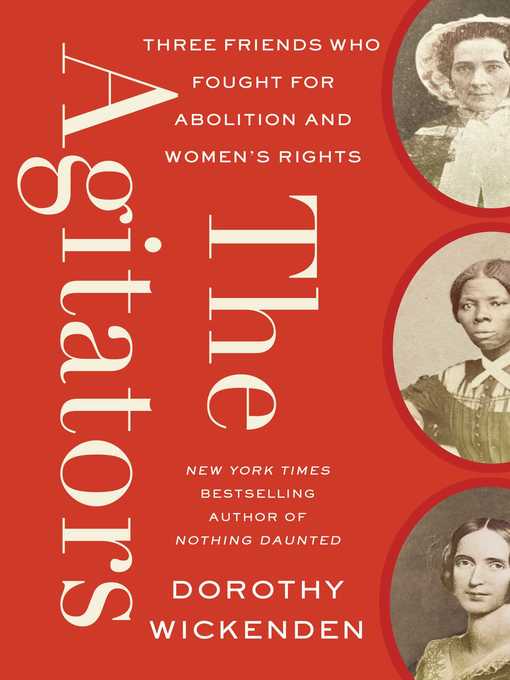
The Agitators
Three Friends Who Fought for Abolition and Women's Rights
- اطلاعات
- نقد و بررسی
- دیدگاه کاربران
نقد و بررسی

February 1, 2021
The executive editor of the New Yorker tells the stories of three female friends who defied the social conventions of their day to fight for women's rights and abolition. Harriet Tubman, Martha Coffin Wright, and Frances A. Seward made history as females who fought against the subjection of women and slaves in the 19th century. Wickenden braids together the intersecting threads of their lives and accomplishments into a highly readable, instructive historical narrative. The daughter of Nantucket Quakers who opposed slavery and sister of early feminist Lucretia Mott, Wright came to know Seward in 1839 while residing in Auburn, New York. Although Seward lived a life of privilege, the two women bonded over many shared interests, including social reform and an "antipathy to pretentiousness." Wright soon became involved in the abolitionist movement and made her home "a station on the underground railroad." In 1849, Tubman escaped from her master in Maryland and made her way to Philadelphia. There, she met Mott, who actively "preached against slavery and lambasted slavers and clergymen for citing the Bible to justify their sins." Wickenden convincingly speculates that Mott introduced Tubman to both Wright and Seward in the late 1840s. The three quickly formed friendships that united them across race and class in a common fight against White patriarchal oppression. The author sets their stories against a tumultuous backdrop of events--e.g., the Seneca Falls Convention of 1848 and the "bleeding" Kansas massacres of the 1850s--that not only defined the revolutionary spirit of the era, but also caused divisions that still haunt the American soul today. Yet in the strength of the bonds forged among Wright, Seward, and Tubman, Wickenden offers hope for a healing of old wounds and a future where "the dignity and equality of all Americans" is an authentic reality. A well-researched, sharp portrait of the "protagonists in an inside-out story about the second American revolution."
COPYRIGHT(2021) Kirkus Reviews, ALL RIGHTS RESERVED.

February 15, 2021
Women's stories from nineteenth-century America are sparsely told compared to those of male politicians, statesmen, and soldiers. New Yorker executive editor Wickenden brings three fascinating women to life in rich, humanizing detail, and shares how their "insubordination" against slavery and the oppression of women brought them together. These women--Harriet Tubman, Frances Seward, and Martha Coffin Wright (niece of Lucretia Coffin Mott)--were put in each other's paths through geography and a common goal. Wright, reared in a Quaker community on principles of equality; Seward, married to Lincoln's eventual Secretary of State and a staunch abolitionist; and Tubman, creator of a free Black community in the women's shared town of Auburn, NY; all three were involved in the work of the Underground Railroad and all blew apart the stereotypical view of nineteenth-century women. Wickenden pulls this history out of the dry dustiness of fact and adds color and warmth to its retelling. The women of our shared past deserve more treatments like this.
COPYRIGHT(2021) Booklist, ALL RIGHTS RESERVED.

Starred review from April 1, 2021
With this latest work, journalist and author Wickenden (Nothing Daunted) follows the lives of three friends and heroes of the women's rights and abolitionist movements, and describes the ways they impacted both causes. Wickenden effectively argues that these two movements, which were gathering steam during the mid-1800s, did not exist independently of one another; rather, they were intertwined. The author's accessible, engaging writing highlights the life of Frances Seward (1805-65), whose husband William H. Seward, secretary of state to Abraham Lincoln, is also given careful consideration. Along with the Sewards, the book also chronicles the lives of close friends Martha Coffin Wright, a feminist and abolitionist, and Harriet Tubman, who was born enslaved in Maryland and left a lasting legacy after escaping slavery and establishing the Underground Railroad. The author effectively places Seward, Wright, and Tubman in historical context. Accounts of Tubman's life in the Underground Railroad and as a scout in the Union army shine particularly brightly, narrated like the daring exploits they were. VERDICT Filling a gap in the telling of women's and abolitionist history, this highly readable book gives these three women their due. Wickenden's deft touch will allow this book to appeal to a wide audience.--Stacy Shaw, Denver
Copyright 2021 Library Journal, LLC Used with permission.




دیدگاه کاربران